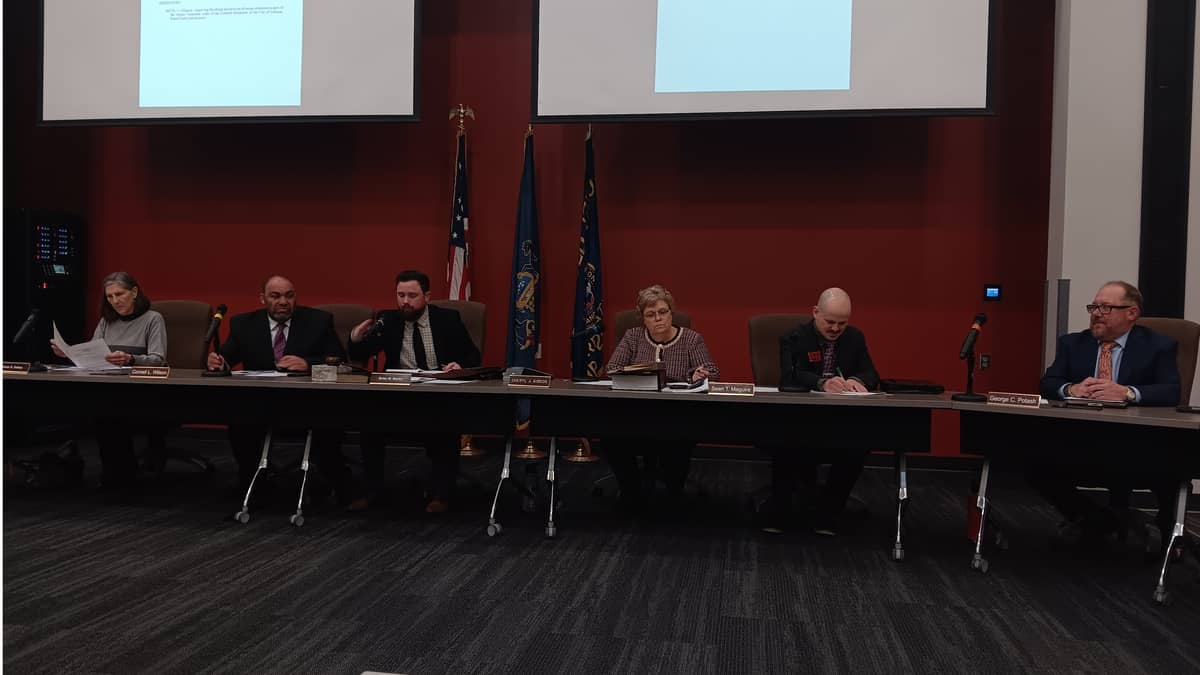In the wake of the May 30 triple murder in Lebanon, Magisterial District Judge Aurelis Figueroa has come under public scrutiny for her decision to approve a reduction in bail for Alex Torres-Santos, one of three individuals currently being charged for the homicides.
Read More: DA, police shed light on arrest of third alleged shooter in city triple homicide
As LebTown reported today, an administrative slip-up by MDJ Figueroa regarding the terms of Torres-Santos’ house arrest also apparently left Lebanon County Probation unable to detain him for a probation violation in early May.
Figueroa was elected in 2021 for a six-year term as Magisterial District Judge #52-2-01, a position that serves the 4th, 5th, 8th, 9th, and 10th Wards in Lebanon. A background in law is not required to serve as one of Pennsylvania’s 512 Magisterial District Judges.
Figueroa, formerly a project manager and real estate agent, ran on values including “respect for every person who appears before her; humane alternatives to excessive fines; and cultural competency when imposing fair but firm decisions based on the law,” according to her campaign literature.
The bail reduction and probation slip-up might be the most prominent examples of Figueroa coming under scrutiny for her conduct on the bench, but those espoused values have been questioned vocally by local property owners – and appear to have led to an investigation by the Judicial Conduct Board of Pennsylvania, which is bound by the state constitution to keep any investigation confidential and would not confirm or deny any details about a potential inquiry into Figueroa’s tenure on the bench.
Figueroa has not responded to repeated requests for comment.
Property owners allege bias for Hispanic tenants
Some local property owners and managers have seen a connection between Figueroa’s handling of the Torres-Santos case and their own experiences in her court.
Property manager Lori Washington said her experience had been that Figueroa favors Hispanic tenants by default in court appearances. Washington works with four landlords and manages around 20 units in the city.
“If an owner wants to take a tenant to court and they are Hispanic, she will go above and beyond to make sure that tenant stays in the property,” said Washington.
Washington, who identifies as Hispanic and is bilingual, said that at one of her appearances in front of Figueroa, the judge addressed the courtroom in Spanish and said she “fought to take office because I want to fight for the Hispanic community that was being treated unfairly.”
Washington said her response to the judge was that regardless of race, if you don’t feel that you’re doing anything wrong, then you shouldn’t need to have someone stick up for you in a courtroom.
“Pay and stay”
Washington said that even in cases where a property owner was not seeking past due rent and was only seeking to evict the tenant for non-payment, Figueroa would insist on a “pay and stay,” where the tenant can pay past due rent and stay in the property.
Washington and others said Figueroa would refuse to make tenants pay court filing fees and late fees for past due rent, even if the lease allowed it. Washington said she eventually filed a grievance over the filing fee, which Figueroa later asked her about. Washington said that in more recent appearances, Figueroa had granted owners recoupment of the filing fee when the court found in their favor, but the change did not apply retroactively.
Property owner Terry Lerch, who owns over 100 units mostly in the city, said Figueroa leans towards the tenants. Lerch said he’s been in front of her four times regarding evictions.
“If you take someone in for possession, you want the apartment back,” said Lerch. “She gives them an option to pay and stay.”
Property owner Mike Adams said Lebanon’s a tough rental market.
“For the most part, I’m going to say 80 percent of the people are great. But there’s 20 percent of the people we deal with that are difficult. And although we give them every chance we can, sometimes it just doesn’t work out, and we need to evict them.”
Adams said Figueroa had never explained to him why she favors pay and stay.
“When it gets to us, we don’t want a pay and stay,” said Adams. “A lot of the times when we’re at a judge for an eviction, we’ve exhausted all other avenues.”
Property owner Josh Zimmerman said Figueroa definitely favors the tenant.
“Even if you have a signed lease – if you have a lease agreement and it has the details in there – even if it’s a month-to-month lease, it doesn’t matter what it says. The lease isn’t followed, and it’s not upheld.”
Zimmerman said he was in front of Figueroa three times in a row for possession of a property and that even though he wasn’t seeking past due rent, she gave tenants a chance to stay every time.
“You just have to keep coming back to court even though that’s time-consuming and costs money.”
Complaints filed against Figueroa
Lerch said he and other property owners want fair treatment, not special treatment.
“She’s basically a lawless judge,” said Lerch.
“It’s frustrating, it’s really frustrating,” said Frank Anthony, one of the property owners who Lori Washington represents. “If someone goes in and doesn’t pay their rent and starts destroying the property, we have no way to evict them – we can’t run a business.”
Anthony said that as a result of Figueroa’s lax enforcement, landlords could feel compelled to take evictions into their own hands.
“There’s nothing you can do – you can’t fire a judge,” said Anthony.
Washington told LebTown she had filed a judicial complaint against Figueroa and had met with investigators from the Judicial Conduct Board on two separate occasions for at least an hour each. Washington said the meetings took place in the October/November timeframe.
“I, personally, am not asking her to pick her stuff up and leave,” said Washington. “Maybe she needs more training. Maybe she needs someone to show her what she’s doing wrong. I think the law is the law.”
“We just want her to be fair and stop looking at the last names of the tenants,” said Washington.
Lerch said she’s being investigated for more than 30 cases by the conduct board, although that figure could not be confirmed by LebTown.
Judicial Conduct Board investigations
The Pennsylvania Judicial Conduct Board is extremely limited in what it can say about any potential investigation.
Washington said her experience with investigators was impressive. “They’ll listen to you and take a lot of notes,” said Washington.
Washington acknowledged the extreme confidentiality employed by investigators and said that one even quipped, “I can’t even tell you if I talk to God!” regarding the level of confidentially employed by the board and its investigators.
Melissa Norton, head attorney for the Judicial Conduct Board, said it could not confirm or deny any information about possible investigations.
“The constitution requires everything we do is confidential,” said Norton.
Only if a case is filed in the Court of Judicial Discipline would it become public record.
District Attorney Pier Hess Graf had previously told LebTown that she had taken issue with decisions by Figueroa, such as the reduced bail amounts for Torres-Santos, which she called “egregiously low.”
“That type of decision has not been uncommon from that MDJ,” said Hess Graf.
Hess Graf said that on other cases where prosecutors have asked for bail, Figueroa hadn’t imposed it.
“We keep expressing our frustration; we keep doing our job,” said Hess Graf.
Hess Graf noted her office typically doesn’t file appeals in these cases, including for Torres-Santos, because “asking one judge to patently say, ‘Well nothing has changed, but something was wrong’ is a very tough call.”
“That’s essentially what you’re asking the Court of Common Pleas to do,” said Hess Graf. “To say, based on the same set of facts, I would have done something differently. Saying I don’t agree with someone’s decision is not enough.”
Hess Graf would not comment on any possible Judicial Conduct Board investigation.
“We are not supposed to discuss those until there’s an outcome,” said Hess Graf. “Reports are supposed to be done privately.”
“We try to be very careful and abide by all the rules.”
Norton said the Judicial Conduct Board is bound to investigate any complaint or “confidential request for investigation” that it receives, including any from anonymous sources. Norton said that in 2022, the Judicial Conduct Board investigated 945 complaints.
To investigate a complaint, the six attorneys employed by the board (including Norton) conduct interviews and depositions and make a recommendation to the board about any next steps. If the board refers a case to the Court of Judicial Discipline, that’s when it becomes public record. The Court of Judicial Discipline makes the final determination on whether there was misconduct, as well as what sanctions, if any, would be imposed. Sanctions can include probation, fines, suspension, removal, and disqualification from any future judicial office.
Norton said that sometimes a case can be investigated for a year before it is presented to the board and filed in the Court of Judicial Discipline.
“There are cases that end up going to court that I can’t even guess how many attorney hours went into them,” said Norton.
Norton said the Judicial Conduct Board was unique in its constitutional mandate to investigate and review every single complaint that it receives.
“I’m not allowed to just dismiss something,” said Norton.
Questions about this story? Suggestions for a future LebTown article? Reach our newsroom using this contact form and we’ll do our best to get back to you.

Support local journalism.
Cancel anytime.
Monthly Subscription
🌟 Annual Subscription
- Still no paywall!
- Fewer ads
- Exclusive events and emails
- All monthly benefits
- Most popular option
- Make a bigger impact
Already a member? Log in here to hide these messages
You know us because we live here too. LebTown’s credibility comes from showing up, listening, and reporting on Lebanon County with care and accuracy. Support your neighbors in the newsroom with a monthly or annual membership, or make a one-time contribution. Cancel anytime.

























